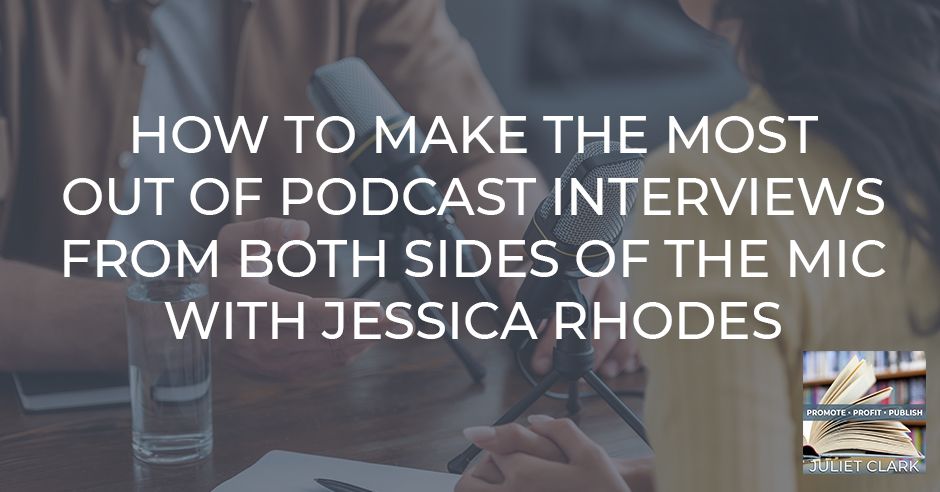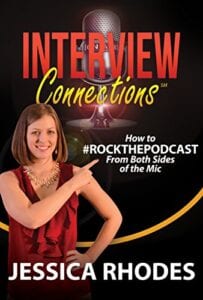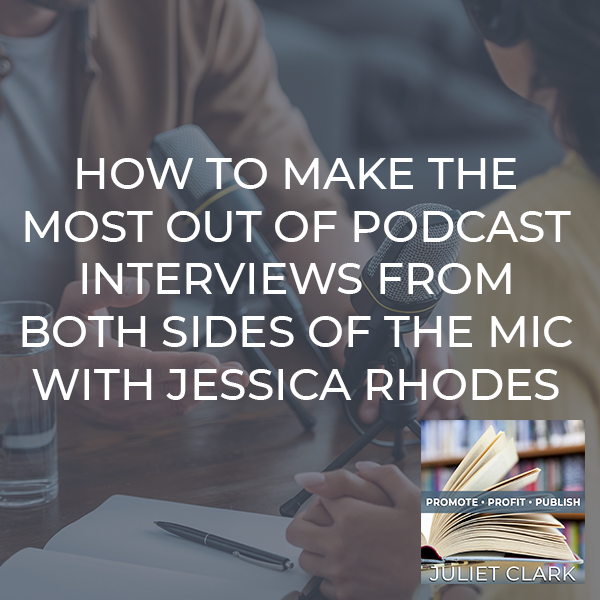
Podcast interviews are a good way to achieve visibility and build brand awareness in your audience. However, good podcast guesting involves so much more than just showing up and doing a great interview. It’s about giving something actionable and of value, promoting and positioning yourself as someone who is in demand in your industry and building a genuine relationship with the host and their audience even before and after the episode. And you have to do it all without being salesy or sounding like a politician! These are but some of the tips that we can take away from this conversation between Juliet Clark and the ultimate podcast guesting expert herself, Jessica Rhodes. Jessica is the founder of Interview Connections, host of Rock the Podcast and creator of the podcast booking industry. She is the leading expert on how to leverage podcast guesting for increased brand awareness, more leads and higher profits. Listen in and learn how you can change the way you present yourself in podcast interviews for the better.
—
Watch the episode here
Listen to the podcast here
How To Make The Most Out Of Podcast Interviews From Both Sides Of The Mic With Jessica Rhodes
Before we get started, I have to send you to all those places again. You aren’t doing a very good job of getting there. There you’ve been scolded. Remember to go over to YouTube and subscribe to Superbrand Publishing. Don’t forget to take our Promote Profit Publish Quiz. You can find it at www.PromoteProfitPublishQuiz.com. Find out if you’re ready to publish. Do you have your audience built? Do you have your marketing campaigns ready? Do you have what it takes to be a best-selling author? My guest is another podcast guest and she pointed out that I’ve had a lot of guests lately.
Her name is Jessica Rhodes. She’s a leading expert on how to leverage podcast guesting for increased brand awareness, more leads and higher profits. She created the podcast booking industry in 2013 when she Founded Interview Connections, the first and leading agency of its kind. Along with their business partner, Margy Feldhuhn, Jessica quickly scaled Interview Connections to over $1 million in annual revenue with nearly no direct marketing or advertising. Their team of in-house booking agents are the podcast powerhouses behind many successful entrepreneurs and businesses, including Ali Brown, Perry Marshall, AWeber, USA Financial and more.
Jessica has done hundreds of podcast interviews both as a guest and a co-host to Rock The Podcast. She’s the acclaimed author of Interview Connections: How to #RockThePodcast From Both Sides of the Mic and has been a featured speaker at Podfest Multimedia Expo and FinCon. She’s also an active member of her community. She volunteers at our son’s public schools and mentors a 17-year-old girl in foster care. She lives in Rhode Island with her husband, two kids, Nathan and Lucy, and a senior cat, Kitten. She has a very good sense of humor. Welcome.
Thank you so much for having me. I’m excited to be here.
Do you live at the beach?
I live in Rhode Island. We have lots of shoreline, very close. We spend a lot of time at the beach.
I used to live in Manhattan beach. When I moved to Utah, I noticed several homes have beach themes. They’re trying to feel the beach even though they don’t have it near them. It was funny because even though I lived at the beach, my house wasn’t as beachy as theirs is and they live in the middle of pretty much nowhere.
We used to live close to the water and then we moved into Providence. This is the only little corner of the house where I’ve kept the beach themed. We don’t have it in the rest of the house.
I miss the beach when I moved to Utah and I don’t miss it.
Utah is beautiful. I went out there for a business trip a couple of years ago and it’s breathtaking. The mountains are great.
If you give people something actionable that they can do today, they’re going to be your fan forever. Share on XNow it’s getting cold. Cold and I are not friends yet. We’ve had a couple of shows in the past where we’ve talked about, how do you get yourself booked? What’s the way to do it? Now you’ve been on a podcast. You got that booking for yourself. How do you promote that and be the guests that people want over and over because you’re the promoter?
As we were talking about, your interview with Tom Hazzard was amazing. I agree and love all of his tips about pitching. I am excited to talk about now monetizing your interviews and making the most of the interviews once you’re there. There are a few different strategies for monetizing your guest expert appearances that a lot of people don’t think about. Number one, the thing that most people think about is the exposure. You are on a podcast. There are people listening. What are you going to do with that exposure? We can start there and then go into some other strategies. Making the most of the exposure is first of all, sharing your story. Making sure people see and know who you are. The host does a great job at that. I’m like, “You got to know that I live in Providence.” That is a part of it because people want to work with people that they feel like they have a connection to. I guarantee anyone listening who happens to live in Providence, Rhode Island or Rhode Island, or even New England, is they’re going to have a, more of a connection to me than other people who do what I do. We all live in the same part of the country.
It’s little things like that cannot be underestimated because people like having that sense of connection. The first part of it is sharing your story and then it’s about sharing value, being that open book. Making sure that you’re not holding back or saying, “I’m going to talk a little bit here, but then you have to go get X, Y, Z.” Sharing as much valuable, actionable content as you can in the time that you have allotted on that interview.
I shared with you when we jumped on, I got off a summit. That was one of the things I said is, “Quit being afraid to reveal your whole process and give value with it.” Ninety-five percent of the people out there will never pull a trigger. They’ll never do what you tell them to do so be transparent about it.
We’ll teach everyone everything that we do because there are going to be people that get it and they want to understand what they’re paying you to do. It’s why it’s smart. For example, if you want to hire a financial planner, it’s good to read a book or two about financial planning so you know if you’re hiring someone that’s legit. Not that you’re going to read that book because you’re going to do your own planning, but it’s helpful for people to see that you’re an expert because then they feel more confident and paying you to do the thing that you taught them how to do.
One of our clients Merrill Chandler, who is going to be on right around the same time you are, he has this juicy two-day workshop where he tells you everything and you sit there and you’re like, “I will never be able to do it myself.” There’s a lot of information in it. Don’t be afraid to put it out there and give people. Especially feel like if you would you give somebody something actionable that they can do now, they’re going to be a fan forever.
It’s the power of reciprocity. When people feel like they’ve gotten so much from you for free, they do feel like they owe you something in return. They are more likely to want to work with you. The first part of it is make the most of your interview. What do you have? Twenty-five minutes sometimes up to an hour if it’s a longer interview, but don’t waste that time. Share as much as you can, as much value that moves the audience to want to get more from you.
Share it in a non-salesy way. I hear podcast hosts all the time say, “So-and-so got on my show and he sounded like a sales pitch the whole way through.”
This is my second interview that I did. My answer is always the same when the host asks like, “What do you want to talk about or what do you want to make sure we cover.” I always say, “Whatever your listeners are going to find the most value in, I am here to be of service to your audience.” If a host asks you that, you don’t want to be like, “I want to make sure that we talk about my book because that’s launching. I want to make sure we do this.” We all know we’re doing this for exposure. We’re all entrepreneurs, but you are there to be of service and a value. Have a call to action, have a free gift or somewhere that the readers can find you online because when you do give value and do share your story, if that opportunity arises for the host to say, “Where can listeners connect with you,” have a place to send them. Don’t be like, “Let me give you five websites.”
This is what you sound like when you get on in your salesy, like Ted Cruz gets on TV and they ask him a question. He says, “That’s why I introduced legislation too.” Don’t be that guy.

Interview Connections: How to #ROCKTHEPODCAST from Both Sides of the Mic
Don’t be a politician.
I came to answer a question and now I have to tell you something very self-serving about myself.
I want to give some tips on calls to action because that’s a big pitfall that I see. It’s a big missed opportunity. When the host asks you where listeners can connect with you or for a free gift, many podcasts guests are so excited for that opportunity. They want to say, “You can follow me on Instagram. I also have a Facebook page. This is my website.” Resist the urge to give every single place that you’re hanging out online. I know you want people to follow you everywhere and you want to make sure they get everything. You want to over-deliver in the interview, but with the call to action, give one, maybe two but one.
“My address is, and you can stop by any time as long as you bring a check.”
It’s a way too much people are listening on the go. People only listen to podcasts on my phone. I’m not sitting at my computer if I want to get in touch with the guest. It has to be something that I can remember, something that I can spell. If you have a name that’s hard to spell, you don’t have them spell your name in the domain. Come up with a URL where people can easily type it in or maybe a text call to action, but keep it simple. We don’t use Margy’s name as the domain. Let’s say you have JulietClark.com and people spelled Juliet wrong. You can send them to something much easier and forward it there. They’ll remember it, something snappy to do that. I do that with my calendar. I have the chat with Juliet.com because it’s easy to remember.
Tell us more about that. You bring up such a great point because I only listen to podcasts on my phone and usually when I’m running or I’m in the car.
There are a few different calls to action that I recommend that I find valuable. It depends what your goals are and what your business is. People overthink this a lot. Guests think they have to come up with a whole funnel and do this whole landing. They over-engineer it. When in reality, people that hear you on a podcast are usually like ready to connect with you or they want to find you on social media. They want to build a relationship. Usually, when I hear a guest that I like, first I see if they’re on Instagram because that’s where I spend a lot of time or on Facebook. I want to connect with them first socially. Keep the barrier to entry low.
If you have a great lead magnet, like I love quizzes. I know you said you got a quiz. Quizzes are great. People love to get that information. If you have a great report or something where they’re going to get valuable information, send them to a simple landing page, but it could be as simple as, “Send me an email.” We have guests that we book that use their email as their call to action. They’ve gotten amazing opportunities and clients who hear them on podcasts, send them an email and they have business. Simplicity is the key.
It is. I’m going to give you guys a tip beyond that on there. If you’re a podcast listener, if you’re appealing to podcast listeners and you have a book, have an audiobook because those people are audiobook listeners as well. Don’t be like go over to my so and so book page. Send them to Audible. They can take out their phone with the Audible app and get that book right then and there so be smart about that as well.
Knowing how people consume content is important. Not everyone’s going to listen to podcasts, not everyone’s going to read a book, so you want to be available in multiple formats.
Podcast guesting is not just showing up and doing a great interview. Your relationship with the host before and after the episode matters. Share on XWhat about after? I have people on podcasts all the time and I find that the more famous they are, the less they promote, which sucks. Some of them have asked me to be on my podcast. It’s not like I sought them out. What’s a good podcast guest do afterwards?
First of all, this is such a misconception. People will start a podcast and they’re like, “I want famous people on my show that are going to help me grow.” I’m like, “The people with the bigger audiences are a lot more discerning and what they’re promoting or they don’t promote. Who knows why?” A great podcast guest who wants to maximize the opportunity is going to promote it. They’re going to make the most of it. Podcast guesting is not showing up and doing a great interview. That’s only one part of it. It’s your relationship with the host before and after the episode. You and I met through a networking group. We’ve had a call. I interviewed you on Facebook Live now I’m here. I didn’t like come on your show and then we’re never going to talk again, or we’ve never talked before. Some actionable tips for readers is listen to their show beforehand. Listen to an episode, leave a rating and a review.
I always recommend listening and then leaving a rating and review. I never want people to leave like a dishonest one or something that’s like, “Great show,” be honest, leave a great rating and review, post about it. I posted on Facebook, “I’m excited to be on Juliet’s show. Listen to this episode. Check it out. I can’t wait to share it.” Share about it because not only is that helpful to the host and their show, it also is positioning you to your audience as somebody that’s getting interviewed. When your following sees that you’re out getting interviewed, they see you as somebody that’s in demand. They’re like, “She must be up to something. She’s out there getting interviewed.”
It’s the same thing after the interview goes live and after you record, be talking about it, be promoting it, be connected. I realized, “Juliet and I aren’t friends on Facebook yet.” I sent you a friend request. Be connected with the host because podcast hosts a lot of times end up becoming work with their guests. I interviewed someone on my podcast and I became her client like the next day. After the interview, I was like, “I need what you have,” and that happens all the time.
It does. Full transparency, I got kicked off Facebook a few months ago. That’s why you had to re-friend me. The great conservative purge and I’m not even conservative, I’m a libertarian. It’s a great point. When we jumped on, I said, “You interviewed me. I don’t think I ever got the link.” Let’s talk about that strategy because one of the things we do as guest is, we go, “I got the problem materials and it’s a one and done.” There are so many things we can do to promote long-term and keep coming back to it.
This has all comes back to having systems in place because people get into podcasting or podcast guesting because it is easy. It’s showing up, having conversations and creating great content, but then to maximize it and take it to the next level and make the most of it, you do need systems in place to then promote it and leverage it. Making sure your guests get the links in the marketing assets and the sample posts and all of that. Making sure stuff gets scheduled or rescheduled if need be, all of that takes systems. It’s more than the entrepreneur can handle themselves. If somebody doesn’t have an assistant or a marketing team member that can do a lot of that, it doesn’t get done. I speak from experience because up until 2020, I did it all myself in terms of marketing.
I have an admin assistant and we have a marketing team member. Whenever an interview goes live, I send it to Sarah. I’m like, “Go share, promote this,” or if I need to schedule an interview, I’m like, “Ava, go schedule this.” That’s important if you’re going to be getting into podcasting, you don’t have to have a team in place right now. Know that should be on horizon of building out the systems and getting the team in place to support you as you scale and leverage.
I bought a program management system. I said, “I’m getting these bigger and bigger book projects and I have the quizzes.” Now that you’ve said that I can probably manage the content calendars and all that through there as well. Now, I have a lot of work to do. I’ve seen a lot of nice things. I have a system where my content calendar, I share my new podcast every week. I share two older ones and I share two interviews that I have been on with other people. Not because I’m a narcissist because I want to be that good guest who shares their stuff over and over. How do you create a system? I’ll share another one that I’ve seen that I love with you.
I’m all about simplicity. I know there are amazing software, project management tools and marketing calendars that automate it and all that. We like to use HelloWoofy. They help us create a lot of great posts. They know what emojis to use. We use HelloWoofy. He’s a client of ours. We use that to create the posts. We have simple Google Docs where it says like, “Monday, Tuesday, Wednesday, Thursday, Friday, what are we posting on what platforms?” We have a Google spreadsheet where we have listed all of the interviews that we’ve done, all the shows we’ve been on, who is the host, what is their email? Having it all organized and then again, having that set day where we say, “This is the day that we’re going to be posting an interview that we’ve done.” If no new interview went live that week, we’re grabbing an interview that went live a month ago and resharing it. It’s about scheduling it out. I do want to mention for folks that can’t wrap their brain around all of the systems and everything. Keep it simple. If you don’t have the capacity or the bandwidth to be creating a whole toolkit of marketing assets for your guests, start with emailing your guests with a link and saying, “Would you share this?” Start small and then work your way up from there.
Do you know Scott Carson?

Podcast Interviews: Knowing how people consume content is really important. Not everyone’s going to listen to podcasts, so you want to be available in multiple formats.
Yes. Is he a real estate investor?
Yeah. He teaches real estate investors. Scott does so many interviews. He has on his media page, on his site, the covers and the links to every interview he’s been on. It’s incredible. It not only showcases that he’s highly in demand, but it’s a beautiful presentation for these other people as well.
That’s something that I always recommend as well is having a press page on your site because people that find you, we’re talking about getting books and monetizing the interviews, but people are going to find you through other ways. If they see that you are available for interviews and that you do interviews, they’ll start requesting you. It’s always great to get incoming requests as well. Part of the way you can attract those interviews is through those press pages. I love that.
Another example of a great press page is our client, Tony Guarnaccia, has one meet. His last name is Guarnaccia. He is not exactly giving that call to action, MeetTonyG.com. He’s done a beautiful job of showcasing his interviews on his site. I know it’s helpful to see different press pages. Everyone’s got different styles. I wanted to share that if anyone wants to see Tony’s website and see how he promotes his interviews. He does a great job. He’s all about leverage. He does a great job at people. He posts about them. People will DM him and invite him onto their shows. That’s another great example.
My question was, if you’re going to have a page like that, should you have also some fill out form where people can request you?
Yeah, I don’t see why not. On my press page, we’ve got our email, phone number. If you’d like to invite us onto your show, reach out. For folks that are maybe high demand and they’re getting a lot of requests, it’s totally fine to have a simple form that says, “Put a link to your show.” Any other qualifying information like, “How do you decide if you’re going to be a guest on someone’s show,” maybe ask some of those questions in the forum.
That doesn’t have to be a big, expensive form. I use JotForm. It’s like $18 a month. I use it for everything. I have contracts. I have all stuff in there. It’s very used. Where can we find you if we want to find out more and you have a workshop or masterclass coming up, don’t you?
Yeah. We do free masterclasses to teach business owners on how to monetize their interviews, how to get started as a podcast guest. You can register for the next one at InterviewConnections.com/masterclass.
Thank you so much for being on. That was some great information.
Thanks, Juliet.
Important Links
- Superbrand Publishing – YouTube
- www.PromoteProfitPublishQuiz.com
- Interview Connections
- Podfest Multimedia Expo
- FinCon
- Margy Feldhuhn – LinkedIn
- Rock The Podcast – Apple Podcasts
- Interview Connections: How to #RockThePodcast From Both Sides of the Mic
- Tom Hazzard – Previous episode
- Merrill Chandler – LinkedIn
- HelloWoofy
- Scott Carson
- MeetTonyG.com
- InterviewConnections.com/masterclass
About Jessica Rhodes
 Jessica Rhodes is the leading expert on how to leverage podcast guesting for increased brand awareness, more leads and higher profits. She created the podcast booking industry in 2013 when she founded Interview Connections, the first and leading agency of its kind.
Jessica Rhodes is the leading expert on how to leverage podcast guesting for increased brand awareness, more leads and higher profits. She created the podcast booking industry in 2013 when she founded Interview Connections, the first and leading agency of its kind.Love the show? Subscribe, rate, review, and share!









Leave A Comment